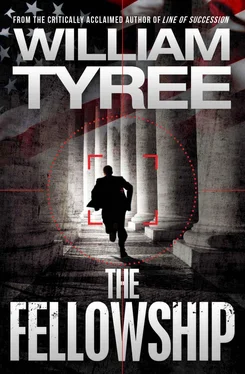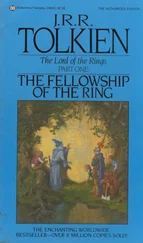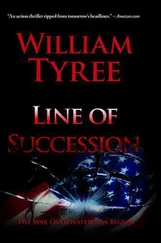William Tyree - The Fellowship
Здесь есть возможность читать онлайн «William Tyree - The Fellowship» весь текст электронной книги совершенно бесплатно (целиком полную версию без сокращений). В некоторых случаях можно слушать аудио, скачать через торрент в формате fb2 и присутствует краткое содержание. Год выпуска: 2013, Издательство: Massive, Жанр: Триллер, на английском языке. Описание произведения, (предисловие) а так же отзывы посетителей доступны на портале библиотеки ЛибКат.
- Название:The Fellowship
- Автор:
- Издательство:Massive
- Жанр:
- Год:2013
- ISBN:нет данных
- Рейтинг книги:5 / 5. Голосов: 1
-
Избранное:Добавить в избранное
- Отзывы:
-
Ваша оценка:
- 100
- 1
- 2
- 3
- 4
- 5
The Fellowship: краткое содержание, описание и аннотация
Предлагаем к чтению аннотацию, описание, краткое содержание или предисловие (зависит от того, что написал сам автор книги «The Fellowship»). Если вы не нашли необходимую информацию о книге — напишите в комментариях, мы постараемся отыскать её.
The Fellowship — читать онлайн бесплатно полную книгу (весь текст) целиком
Ниже представлен текст книги, разбитый по страницам. Система сохранения места последней прочитанной страницы, позволяет с удобством читать онлайн бесплатно книгу «The Fellowship», без необходимости каждый раз заново искать на чём Вы остановились. Поставьте закладку, и сможете в любой момент перейти на страницу, на которой закончили чтение.
Интервал:
Закладка:
An astonished silence settled over the boys, which was followed by an electric gush of cheer. Lang had been wrong about the destination. The cadets were not bound for Ahnenerbe headquarters in Berlin, as he had predicted.
Wewelsburg Castle had deep nostalgic significance for all young Germans. It had been mythologized in nearly every Indo-Germanic history course. Every boy at the Reich School knew that in the year 9 AD, on the very property where Wewelsburg Castle now stood, Germanic tribes had gloriously defeated three Roman legions in the Battle of Teutoburg Forest. At nearby Paderborn Cathedral, Charlemagne had been made the first emperor of the Holy Roman Empire in 799 AD. Hillside fortresses dated back to the ninth and tenth centuries and had been built and destroyed numerous times over the past millennium.
Wolf’s worries seemed to fall away. He suddenly felt as if he were on a pilgrimage. Or in a fairy tale. He looked at Lang, whose face was filled with ecstasy.
Nagel allowed the cadets 30 seconds of jubilation, and then settled his index finger over his lips until they had quieted. “Each of you has been chosen for a special purpose,” he said. “The Deutsches Ahnenerbe is the soul and conscience of the SS. The success of our research and operations is directly proportional to the strength of the German culture. We are therefore the guiding light for the entire Third Reich. As such, Reichsfuhrer Himmler has brilliantly restored Wewelsburg Castle to be the beating heart of the Ahnenerbe. The Fatherland’s spiritual epicenter for the next thousand years. Your journey, my boys, will begin there tonight.”
Paderborn Station
By the time their train arrived at the station, it was nearly 10 o’clock. The cadets were hungry, but the SS soldiers were all business, ordering them into the backs of three Opel trucks identical to the ones that had ferried them from Feldafing to Munich that day.
The truck picked up speed as the city streets gave way to a country road. Wolf pulled his peacoat from his suitcase. Although it was cold in the open-air vehicle, it was nothing compared to the morning swims in frigid Lake Starnberg.
Thoughts of the lake triggered memories of Albert. The image of Albert’s body slung over the thresher flashed in his mind. And then — proof that for every action in the world there was an equal reaction — there had been Beck, lying in the field on the other side of the barn. Wolf allowed himself to linger on the image of the bluish smoke wafting up from Himmler’s sidearm. Maybe Beck deserved that, Wolf mused. The bastard’s negligence had killed Albert.
Lang shook Wolf out of his daze, pointing out beautiful lamp-lit farmhouses and country manor homes as they drove in the woods outside Paderborn. He took in a deep breath for what seemed like the first time all day, noting the sweet scent of the conifer forest as the truck climbed a series of foothills. Soon, the branches of enormous beech and oak trees arched over the road. The night air grew several degrees cooler. Lang drew close, his teeth chattering.
When the truck finally stopped, Wolf leaned out the back and found himself face to face with an SS guard holding an MP-38 submachine gun in his left hand. A second guard appeared at his side with a flashlight. The guard peered into the truck bed, counting the 11 boys within.
“Welcome to Wewelsburg Castle,” he said finally, and shouted for the guard to open the gate.
The truck motored across an arched stone bridge that was built over a moat. Torches were lit along the castle walls. An SS guard stood inside a sentry box, rubbing his gloved hands together to keep warm.
Nagel’s voice cried “Attention! Out of the trucks!”
The boys climbed over each other to get a look at the castle at night. It was too dark to see much, but Wolf’s Jesuit teachers had equipped him with enough knowledge to imagine what he could not see. It was constructed of yellow stone with three towers in a triangular pattern. Seen from an airplane, it was said to resemble the shape of the Holy Lance, the spear used by Longinus to pierce Christ’s side during the Crucifixion. The triangular-shaped castle’s north tower formed the spear’s tip, with the two domed towers forming its sides, and the road leading up to it comprising the lance’s shaft.
Nagel commanded the boys to line up. They did, standing in two neat rows in the crisp night air. “With radiant hearts,” he said, “You will now enter Wewelsburg Castle, prepared to carry out what the nation, the National Socialist State and I expect of you.”
They marched through an arched doorway decorated with stone-etched images of the Nordic gods Thor and Odin. The entrance hall was a great, oak-paneled room that, judging by the exposed wiring strung along one wall, had only recently been outfitted with electricity. The glow of several low-wattage lamps revealed suits of armor, medieval crossbows and immaculate tapestries. Wolf was awestruck by the size of the roaring fireplace, which was nearly tall enough to stand in.
Even at this hour, restoration efforts were underway. Two workers were busy hanging an oil painting. Crude cross-shaped patches were sewn to the chests of their striped shirts and pants.
Nagel halted the march. He went to the head of the line, sweeping his hand across the scene before them. “These are just two of hundreds of foreign workers living in a nearby camp for stonemasons, carpenters and electricians. They are Jehovah’s Witnesses, and they are free to go at any time. We ask only that they renounce their religion, swear obedience to Hitler and join the German Army. Fortunately for my reconstruction project, they have so far been unwilling to do so.”
Wolf did not know what a Jehovah’s Witness believed. He had been told by his mother that they were not real Christians and would not be permitted into heaven. Then again, she had said the same thing about Lutherans, and Wolf had met plenty of very decent Lutherans.
The cadets followed Nagel down a narrow set of stone stairs, through two sets of iron gates, and into an enormous cavern that was stuffed with artifacts. The boys were surrounded on either side by portraits of Germany’s leaders dating back to the Middle Ages. An enormous portrait of King Heinrich was suspended over the entrance by wires at an angle of 45 degrees, giving the stoic king the impression of one looking down from the heavens.
“You are now standing in Himmler’s private museum,” Nagel said in a tone that was gentle, almost fatherly. “As each of you will learn, ancestry is as fundamental to the war effort as the innovation of new weaponry. In light of these directives, Himmler has given his permission for you to experience your heritage firsthand.”
Wolf disengaged from the pack, wandering, not knowing where to begin. Every corner seemed to be filled with priceless artifacts. He first gravitated toward several slabs of cut stone, each decorated with ancient runic etchings. They looked impossibly heavy. How many weeks had it taken to bring them here? How many mules or tractors had it taken to haul them to the nearest train?
Along the same wall, bronze urns, swords, ancient sculptures and jewel-encrusted daggers were showcased in shallow enclaves. A series of glass enclosures held piles of ancient Roman coins and rings with precious gemstones. So numerous were the artifacts that many seemed to be hastily thrown together, stacked in mismatched piles.
He examined a delicate lute that was estimated to be 600 years old. Next to it, a display of ancient battle gear used by Teutonic knights. A scarred triangular shield painted with a red cross. Thirteenth century chainmail, now rusted, as worn by mounted warriors. A breastplate bearing the Teutonic emblem. Axes, spurs and bonze bits for medieval warhorses.
Читать дальшеИнтервал:
Закладка:
Похожие книги на «The Fellowship»
Представляем Вашему вниманию похожие книги на «The Fellowship» списком для выбора. Мы отобрали схожую по названию и смыслу литературу в надежде предоставить читателям больше вариантов отыскать новые, интересные, ещё непрочитанные произведения.
Обсуждение, отзывы о книге «The Fellowship» и просто собственные мнения читателей. Оставьте ваши комментарии, напишите, что Вы думаете о произведении, его смысле или главных героях. Укажите что конкретно понравилось, а что нет, и почему Вы так считаете.











